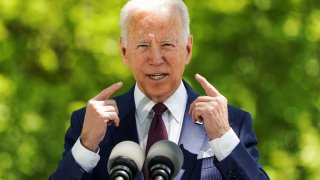
- President Biden will call on Congress to pass $1.8 trillion in investments and tax credits aimed toward children and families.
- Biden will pitch the new spending plan before a joint session of Congress less than a month after he issued a sweeping $2 trillion infrastructure proposal.
- The new proposal, which includes about $1 trillion in investments and $800 billion in tax credits over a decade, will be fully offset in 15 years in part by raising the amount of taxes paid by the richest Americans, the White House said.
President Joe Biden on Wednesday will pitch Congress on $1.8 trillion in new spending and tax credits aimed toward children, students and families, senior administration officials said.
Biden will unveil the massive new package less than a month after the White House issued a sweeping proposal to spend more than $2 trillion over eight years on infrastructure and other projects. Together, the plans comprise the Biden administration's vision to overhaul the U.S. economy as the nation seeks to recover from, and look beyond, the coronavirus pandemic.
We're making it easier for you to find stories that matter with our new newsletter — The 4Front. Sign up here and get news that is important for you to your inbox.
The new proposal, which includes about $1 trillion in investments and $800 billion in tax credits over a decade, will be fully offset in 15 years in part by raising the amount of taxes paid by the richest Americans, the White House said.
Here's some of what the new plan calls for:
- $225 billion toward high-quality child care and ensuring families pay only a portion of their income toward child-care services, based on a sliding scale
- $225 billion to create a national comprehensive paid family and medical leave program
- $200 billion for free universal preschool for all 3- and 4-year-olds, offered through a national partnership with states
- $109 billion toward ensuring two years of free community college for all students
- About $85 billion toward Pell Grants, and increasing the maximum award by about $1,400 for low-income students
- A $62 billion grant program to increase college retention and completion rates
- A $39 billion program that gives two years of subsidized tuition for students from families earning less than $125,000 enrolled in a four-year historically Black college or university, tribal college or university, or minority-serving institution
- $45 billion toward meeting child nutritional needs, including by expanding access to the summer EBT program, which helps some low-income families with children buy food outside the school year
- $200 billion to make permanent the $1.9 trillion Covid stimulus plan's provision lowering health insurance premiums for those who buy coverage on their own
- Extending through 2025, and making permanently fully refundable, the child tax credit expansion that was included in the Covid relief bill
- Making permanent the recent expansion of the child and dependent care tax credit
- Making permanent the earned income tax credit for childless workers
"These are investments that we can't afford not to make as a country," a senior administration official said Tuesday night in a conference call with reporters.
Money Report
To fund the programs and tax perks, the proposal would, in part, reverse key pieces of the 2017 tax-cut law, the key legislative achievement of former President Donald Trump's first year in office.
The Biden administration's new spending plan would hike the top income tax rate to 39.6% for the wealthiest Americans. That rate had been cut to 37% for married couples with over $600,000 in taxable income as part of the 2017 law.
The plan would also seek to close a series of tax loopholes, and raise taxes on capital gains to 39.6% for households making more than $1 million.
The Biden administration maintains that under the new plan, no one making $400,000 a year or less will see their taxes go up.
Biden is set to detail the plan Wednesday night, during an in-person address before a joint session of Congress that also lays out his administration's broader legislative priorities. The event comes on the eve of Biden's 100th day in office.






